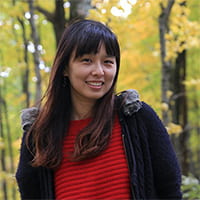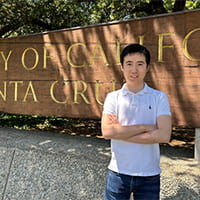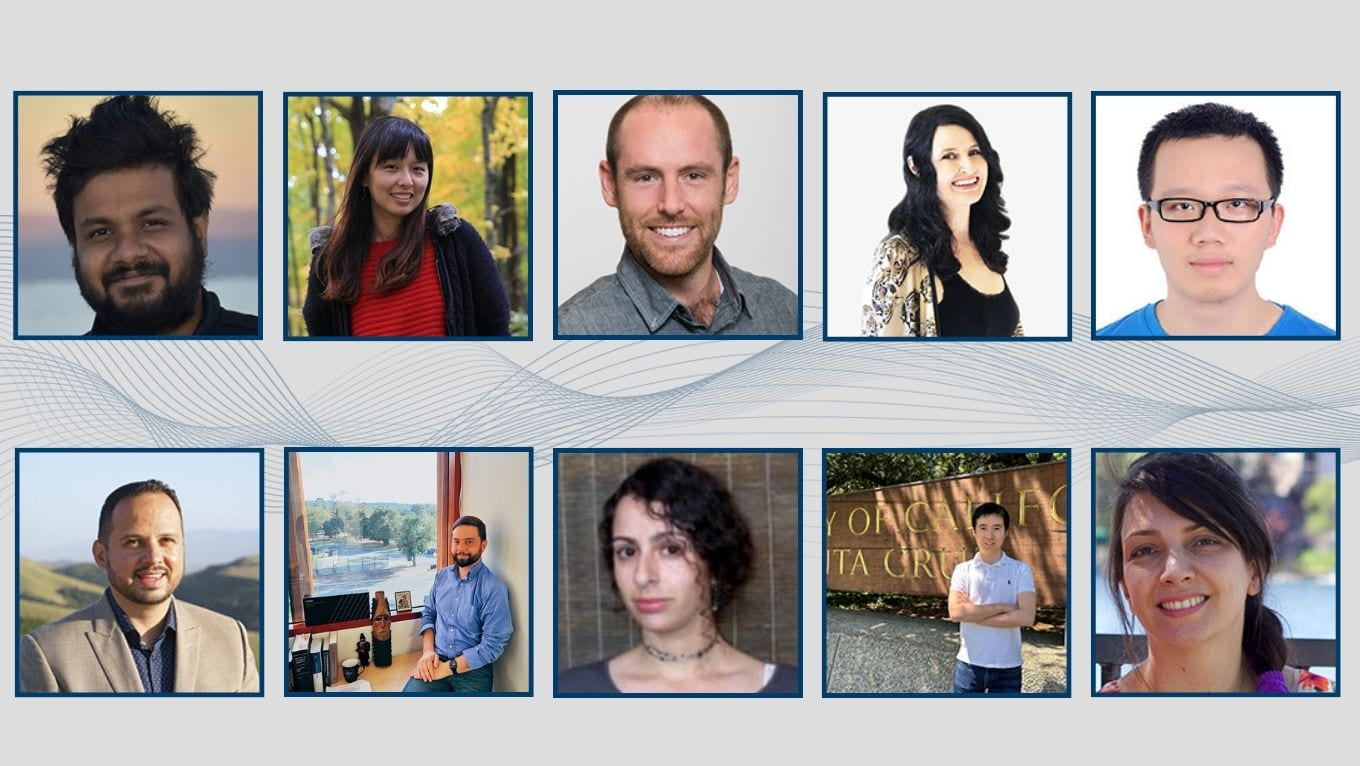The Baskin School of Engineering welcomes 10 new faculty members to the academic year, bringing the 2023–24 faculty count to 129.
Joining us from academia and industry, they bring a wide range of subject matter expertise, including deep learning, robotics, precision health, informatics, user design, computer security, environmental engineering, and more. They also bring an unwavering commitment to teaching and mentoring the next generation of engineers.
“Our new faculty are pushing the boundaries of modern-day engineering, conducting bold research with immense societal impact and transforming engineering pedagogy to be more impactful and inclusive,” said Alexander Wolf, dean of the Baskin School of Engineering. “Together, their research impact and teaching excellence will directly support our upward trajectory in being a leading engineering school for the 21st century.”
Applied Mathematics Department New Faculty

Ashesh Chattopadhyay, Assistant Professor
Academic interests: Theoretical deep learning, dynamical systems, computational physics
Ashesh Chattopadhyay joins Baskin Engineering from industry, most recently working as a staff scientist at the SRI Palo Alto Research Center. He received his Ph.D. in mechanical engineering from Rice University. His research lies at the intersection of theoretical deep learning, dynamical systems, and computational physics aimed at understanding atmospheric dynamics and climate extremes.
“A lot of the most prominent physicists of our time inspire me, but more recently and outside the realms of pure physics, it would be Joseph Licklider and his vision of interactive computing and the modern internet, which was outlandish at the time and so indispensable today,” Chattopadhyay said. “It reinforces belief in crazy ideas and that it’s not just an individual but an ecosystem that pushes science forward.”

Javier González-Rocha, Assistant Professor
Academic interests: Aerial robotic systems, system identification, aerodynamic modeling, urban mobility, AgTech, atmospheric sensing, environmental monitoring
Before joining the Applied Mathematics Department, Javier González-Rocha was a UC Riverside (UCR) Chancellor’s Postdoctoral Fellow for three years. He received his Ph.D. in aerospace engineering from Virginia Tech University. González-Rocha uses system identification, flight dynamic modeling, and low-cost sensors to build aerial robotic systems for environmental monitoring and agricultural technology applications. One of his research projects at UCR included developing drone technology to measure and monitor methane emissions on dairy farms. As a first-generation college student himself, González-Rocha is an advocate for increasing diversity and inclusion in STEM through new programs and initiatives and community building.
González-Rocha is most looking forward to “joining a vibrant community of educators and researchers who are passionate about advancing, diversifying, and increasing participation in engineering fields to achieve meaningful solutions to our most pressing global challenges.”
Biomolecular Engineering Department New Faculty

Alexander Ioannidis, Assistant Professor
Academic interests: Computational genomics, precision health and machine learning in medicine
Alexander Ioannidis joins Baskin Engineering from Stanford University, where he received his Ph.D. and taught for the past two years as an adjunct professor in computational and mathematical engineering and an instructor in biomedical data science at the medical school. His research centers on the design of algorithms and application of computational methods for problems in genomics, biomedical data science, and precision health. Ioannidis also conducts work in population genetics with a focus on diverse and underrepresented populations, particularly in Oceania and Latin America, working closely with these communities to help reclaim ancestral stories and dispersed community connections.
“As a Baskin Engineering faculty, I am particularly excited about pursuing cross-disciplinary work with talented students from across the different engineering disciplines, as well as with researchers at the Genomics Institute,” Ioannidis said.
Computational Media Department New Faculty

Christina Chung, Assistant Professor
Academic interests: Designing systems and tools for healthcare applications, informatics, human-computer interaction
Christina Chung’s research draws from the fields of human-computer interaction and health informatics to design systems that support health and wellness, specifically on the topics of motivating healthy behaviors, enhancing relationships, and supporting clinical care. She comes from Indiana University Bloomington, where she taught as an assistant professor of informatics since 2018. Chung has received numerous awards for teaching and research excellence, including an NSF CAREER Award, a CSCW 2021 Impact Recognition Award, and the 2020 Indiana University Trustees Teaching Award, and has two patents in her name.
“I am constantly fascinated by the intricate bonds people form with themselves, others, and the world,” Chung said. “Exploring why and how these connections arise, identifying when and where they falter, and crafting designs to strengthen and empower these relationships energize me. I am excited to unravel the dynamics of human interaction, sparking insights that enhance lives and nurture profound connections.”

Samantha Gorman, Assistant Teaching Professor
Academic interests: Virtual reality/augmented reality, user design
Samantha Gorman’s practice-research creates narratives, virtual reality (VR)/augmented reality (AR), games, and performance known for innovating emerging immersive platforms while also serving as commercially released media and research and development for partners like Google and Meta. Work by her studio, Tender Claws, includes the upcoming title “Stranger Things VR” and has been featured in The New York Times, Vice, BBC, Verge, Forbes, Wired, CNET, LA Times, and Engadget. Gorman holds an MFA from Brown University in media studies/literary arts and a Ph.D. from The School of Cinematic Arts at the University of Southern California. She comes to UCSC from Northeastern University’s College of Arts, Media, and Design.
“As Baskin Engineering faculty, I’m most looking forward to building further bridges between disciplines, especially between engineering and the arts,” Gorman said.
Computer Science and Engineering Department New Faculty

Niloofar Montazeri, Assistant Teaching Professor
Academic interests: Artificial intelligence, deep learning
Niloofar Montazeri received her Ph.D. in computer science in the area of natural language understanding from the University of Southern California. Her doctoral dissertation, titled “Building a Knowledgebase for Deep Lexical Semantics,” aims to make it possible for machines to deeply understand text beyond statistical representations of meaning by connecting word meaning to theories of commonsense knowledge. She is a former project scientist and lecturer in the Computer Science and Engineering Department of the University of California, Riverside. Montazeri has been teaching courses in the area of artificial intelligence. She is eager to empower underrepresented groups by paving their path to success through various means including student support groups. She hopes to build a culture of care, empathy, and responsibility that can later go beyond student communities.
Montazeri is inspired by “Shahindokht Sarlati (AKA Lady of roses) and her husband Homayoun Sanatizadeh who dedicated their life to empowering people through education and job creation.”

Yuanchao Xu, Acting Assistant Professor
Academic interests: Computer security, architecture, and systems
Yuanchao Xu’s research focuses on improving computer memory security, reliability, and performance through computer architecture and system software. During his Ph.D. program, he received the North Carolina State University Computer Science Outstanding Research Award and published 14 research papers. Xu has been a part of the Systems Research Group at Google since 2021, where he deploys research work into real-world products. His research goal is to provide vertically-integrated solutions for compound challenges of data-centric computing.
“I am fascinated with understanding the compound complexities of applications, systems, and architecture and proposing elegant solutions by considering opportunities from these areas,” Xu said.
Electrical and Computer Engineering Department New Faculty

Hao Ye, Assistant Professor
Academic interests: Machine learning, wireless communication
Hao Ye joined the Baskin School of Engineering in spring 2023. He received his Ph.D. in electrical and computer engineering from Georgia Institute of Technology. Before joining UC Santa Cruz, he worked as a machine learning researcher at Qualcomm AI Research. His research focuses on leveraging machine learning techniques to advance communication networks, especially in the context of AI applications that involve a multitude of edge devices, such as autonomous vehicles.
“What excites me most about being part of the Baskin School of Engineering is the chance to mentor and guide the next generation of talents,” Ye said. “The opportunity to inspire young minds, share my expertise, and help shape their educational journey is immensely rewarding for me.”
Baskin Engineering Divisional Appointments in Experiential Learning

Tela Favaloro, Associate Teaching Professor
Academic interests: Sustainable energy practices and applications
Prior to joining Baskin Engineering as an associate teaching professor, Tela Favaloro taught as a continuing lecturer and adjunct professor in capstone programming in the Electrical and Computer Engineering Department. Her Ph.D is in electrical engineering with an emphasis in the design and fabrication of laboratory apparatus and techniques for electro-thermal characterization, as well as the design of learner-centered experiential curriculum. As a program designer for the sustainability studies minor and as the director of the UCSC Sustainability Lab (S-Lab), Favaloro has worked to establish holistic interdisciplinary programming centered in experiential learning.
“I’m excited to join Baskin Engineering’s experiential learning faculty to develop an inclusion-centered, first-year program in hands on design and problem-based learning to better support students as they enter the engineering fields,” Favaloro said.

Scott Hersey, Associate Teaching Professor
Academic interests: Environmental engineering, chemical engineering, social entrepreneurship
Scott Hersey joins Baskin Engineering from the Olin College of Engineering, where he has taught as an associate professor of chemical and environmental engineering since 2015. Prior to that, he was in South Africa working together with scientists, engineers, government officials, and local communities to develop health-driven pollution offset-programs aimed at improving air quality. Hersey’s research interests lie at the intersection of community-driven design and scientific research to build local capacity for improving air quality. In addition to his passion for environmental justice, he is a strong advocate for effective and innovative undergraduate education.
“I’m most inspired by practitioners who work to decenter their own priorities in order to center the priorities of the communities that they work with,” Hersey said. “I believe that engineers are at their best and most effective when they demonstrate the humility to approach their work in service to communities experiencing injustice. I’m excited to develop partnerships in my role in Baskin Engineering for students to engage in more of that type of work.”
– SHARE THIS STORY –
You May Also Be Interested In
-

2025 Dean’s Awards highlight outstanding Baskin Engineering undergraduate research in AI, cybersecurity, biomedicine, and more
-

Baskin Engineering students sweep SC Launchpad 2025 awards in technology and social impact categories
-

First annual UC Open Summit highlights open source innovation in the UC system

